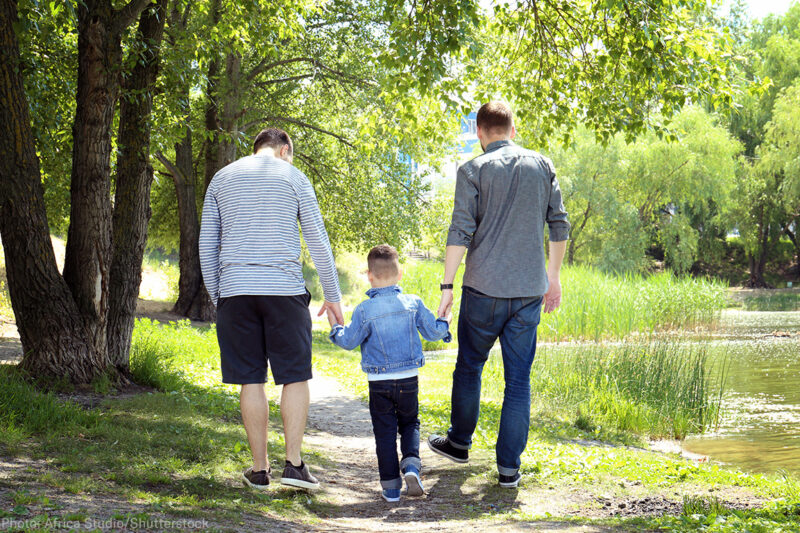Is There a Religious Right to Discriminate Against LGBT Foster and Adoptive Parents? A Federal Court Says No.


Nearly 118,000 children are awaiting adoption in the United States, and yet some religious conservatives are insisting that they have a right to put their own religious beliefs ahead of the best interests of children in the stateÔÇÖs care. This issue is being debated from the halls of Congress to state legislatures to courtrooms across the country. But last Friday, a federal court in Philadelphia said there is no such right.
In a first-of-its-kind ruling, U.S. District Judge Petrese B. Tucker ruled that Catholic Social Services does not have the right to take taxpayer funds and still override the accepted child welfare placement standards because of its religious objections. As the , ÔÇ£[Department of Human Services] and Philadelphia have a legitimate interest in ensuring that when they employ contractors to provide governmental services, the services are accessible to all Philadelphians who are qualified for the services.ÔÇØ
When the government removes children from their families because of abuse or neglect, it often hires private agencies to find foster or adoptive homes for the children. Increasingly, some religiously affiliated child placement agencies, like Catholic Social Services, are asserting a right to put the agenciesÔÇÖ own religious beliefs ahead of the best interests of the children when deciding where to place the kids. WhatÔÇÖs behind this controversy is simple: The agencies donÔÇÖt want to place children with married same-sex couples, people with different faiths, or others who fail a religious litmus test, even when that placement is clearly in the best interest of the children.
The disputes are the latest battleground in the ongoing effort by some religious conservatives to license discrimination in the name of religion. These religious exemptions are a core strategy for undermining LGBT equality , which have grave consequences for LGBT people and others when accessing health care, obtaining government services, going to stores and businesses, and more. In the child welfare arena, discrimination towards LGBT people also has serious consequences for children who need placement in a loving home.
When the city of Philadelphia found out that the Catholic Social Services agency was refusing to comply with the cityÔÇÖs nondiscrimination requirement, it stopped giving that agency responsibility for placing children. Catholic Social Services sued, arguing that it has a constitutional right to deny children good families based on religious objections to those families.
Judge Tucker disagreed, ruling that Philadelphia has an interest in licensing all qualified parents. Additionally, the court : ÔÇ£DHS and Philadelphia have an interest in avoiding likely Equal Protection Clause and Establishment Clause claims that would result if it allowed its government contractors to avoid compliance with the all-comers, nondiscrimination provisions of the Fair Practices Ordinance by discriminating against same-sex married couples.ÔÇØ The decision cited a in which the court recognized that ÔÇ£discrimination is not simply dollars and cents, hamburgers and movies; it is the humiliation, frustration, and embarrassment that a person must surely feel when he is told that he is unacceptable as a member of the public because of his race or color.ÔÇØ
The └¤░─├┼┐¬¢▒¢ß╣¹ has to allow the Support Center for Child Advocates, a nonprofit that represents and advocates for children in the foster care system, and Philadelphia Family Pride, a nonprofit LGBTQ organization whose members include same-sex foster parents and prospective foster parents, to be heard should the case move forward. This decision surely wonÔÇÖt be the last from a court on the subject.
A similar dispute is pending in Michigan. There, some child placement agencies assert that state law authorizes them to discriminate against any prospective foster or adoptive parent to whom the agency has an objection. Two placement agencies turned away , who were seeking to adopt a child in foster care, asserting a religious objection to placing children with same-sex couples. The Dumonts sued, and last week, a federal trial court in Detroit heard oral arguments on the stateÔÇÖs motion to dismiss this case. A decision is expected soon.
Meanwhile, Congress has also taken up the issue, adding to a Health and Human Services appropriations bill that would license discrimination by child placement agencies and override state laws that bar discrimination and protect childrenÔÇÖs welfare.
Some will say that not much is at stake here and that we should allow a little room for religious freedom. This fight, however, isnÔÇÖt about religious freedom ÔÇö itÔÇÖs about finding the best placements for kids in need. When the state removes children from their families, the placement decision should be focused entirely on whatÔÇÖs in the best interests of the children. Agencies hired by the state have should not be able to override whatÔÇÖs best for the kids.
We have already balanced religious freedom and civil rights in America. Overbroad religious exemptions harm kids, LGBT people, women, people of minority faiths, and many others in our society. FridayÔÇÖs ruling gives us one more court decision recognizing those harms and standing against discrimination.
Now it is time for states and Congress to do the same.

